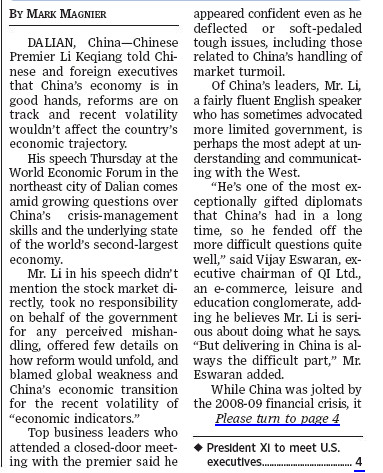Vijay Eswaran appeared in a front page story of the Wall Street Journal where he was quoted after attending a closed door session with Chinese Premier, Mr. Li Keqiang at the WEF in Dalian. The news was headlined – ‘Chinese Leader Vows Soft Landing.’
Chinese Leader Vows Soft Landing
DALIAN, China— Chinese Premier Li Keqiang told Chinese and foreign executives that China’s economy is in good hands, reforms are on track and recent volatility wouldn’t affect the country’s economic trajectory.
His speech Thursday at the World Economic Forum in the northeast city of Dalian comes amid growing questions over China’s crisis management skills and the underlying state of the world’s second largest economy.
Mr. Li in his speech didn’t mention the stock market directly, took no responsibility on behalf of the government for any perceived mishandling, offered few details on how reform would unfold, and blamed global weakness and China’s economic transition for the recent volatility of “economic indicators.”
Top business leaders who attended a closed door meeting with the premier said he appeared confident even as he deflected or soft pedaled tough issues, including those related to China’s handling of market turmoil.
Of China’s leaders, Mr. Li, a fairly fluent English speaker who has sometimes advocated more limited government, is perhaps the most adept at understanding and communicating with the West.
“He’s one of the most exceptionally gifted diplomats that China’s had in a long time, so he fended off the more difficult questions quite well,” said Vijay Eswaran, executive chairman of QI Ltd., an e-commerce, leisure and education conglomerate, adding he believes Mr. Li is serious about doing what he says. “But delivering in China is always the difficult part,” Mr. Eswaran added.
While China was jolted by the 2008-09 financial crisis, it weathered the immediate challenge with a massive stimulus program. The hangover from that stimulus is now compounding its economic woes in the form of a buildup in debt and industrial overcapacity.
A key problem for a one party state is that it takes all the credit when things go well—as it mostly has for three decades of double digit growth—but bears all the responsibility when things sour as they have lately, analysts said. And much of the blame is falling on Mr. Li, who has led plans for economic reforms that have been slow in coming, they add.
“Li Keqiang could become the fall guy. It’s dented his credibility,” said Xi Li, a professor of business at the Hong Kong University of Science and Technology.
State media urged investors to buy shares as the market rose, then the government blocked investors from selling and launched police investigations into “malicious shortsellers” and “rumor mongers” when the market fell sharply after mid-June.
The government’s massive intervention starting July 9 temporarily reversed the selloff on the Shanghai Composite Index, but shares quickly resumed their downward march and have fallen 22.4% since July 23. While relatively few Chinese own stocks, the total loss since the slump started in mid-June has still wiped billions of dollars off the balance sheets of Chinese households.
The stock-market gyrations were followed by a surprise decision last month to devalue the Chinese currency that further roiled global markets. The government’s slow response to a large chemical explosion in the port of Tianjin has added to questions about the government’s management skills.
Mr. Li and Chinese President Xi Jinping were both abroad as stockmarket anxiety escalated in June, adding to an impression of regulatory disarray. When he returned, Mr. Li called a meeting of financial and economic officials, criticized them for failing to anticipate the market plunge and demanded strong measures to support the market, according to officials with knowledge of the
gathering.
Adding to global concern are questions over how much latitude Mr. Li has on economic issues given Mr. Xi’s decision to assume oversight of economic management— traditionally under the premier’s purview—the president’s strong personality and keen interest in politics, defense and an anticorruption campaign that potentially has sucked even more air out of the economy.
“People want to hear not only that they’re in control, but details on reform. They’re concerned that state intervention is negative for China,” said Andrew Collier, managing director of Orient Capital Research, an independent research group, and former president of the Bank of China International’s U.S. office. “For him to give assurance about GDP growth is not going to make global investors feel particularly reassured.”
In fact, economics may not be the biggest factor in Mr. Li’s calculus, said Huang Jing, a specialist on Chinese politics at the National University of Singapore. Messrs. Li and Xi are on the same page, he said. But they face a powerful old guard that benefits from the status quo and doesn’t want stateowned enterprises broken up or markets liberalized, he said. These groups are using the administration’s mishandling of the stock market as a political weapon in advance of several key Communist Party events, Mr. Huang said.
“Obviously Li Keqiang and his whole team bear responsibility for handling the stock market. By intervening in markets, the government changed the rules of the game, like an umpire jumping onto the court,” Mr. Huang said. “But they felt it was necessary to intervene. This is a matter of politics, not the economy.”
By Mark Magnier/The Wall Street Journal Asia
Source: http://www.pressreader.com/international/the-wall-street-journal-asia/20150911/textview







